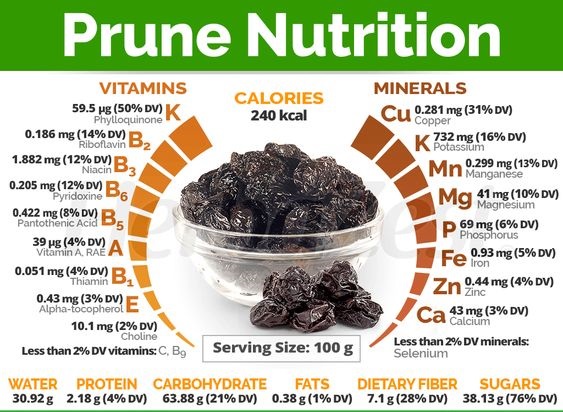Nutritional value per 100 g (3.5 oz) Energy 1,178 kJ (282 kcal) Carbohydrates75.03 gSugars 63.35 g Dietary fiber 8 g Fat0.39 gProtein2.45 gVitamins Vitamin A equiv.
beta-carotenelutein zeaxanthin(0%)6 μg75 μgVitamin A 10 IU Thiamine (B1) (5%)0.052 mgRiboflavin (B2) (6%)0.066 mgNiacin (B3) (8%)1.274 mgPantothenic acid (B5)(12%)0.589 mgVitamin B6 (13%)0.165 mgFolate (B9) (5%)19 μgVitamin C (0%)0.4 mgVitamin E (0%)0.05 mgVitamin K (3%)2.7 μgTrace metals Calcium (4%)39 mgIron (8%)1.02 mgMagnesium (12%)43 mgManganese (12%)0.262 mgPhosphorus (9%)62 mgPotassium (14%)656 mgSodium (0%)2 mgZinc (3%)0.29 mgOther constituents Water 20.53 g
Wednesday, September 03, 2025
Dates
Dates provide a wide range of essential nutrients, and are a very good source of dietary potassium. The sugar content of ripe dates is about 80%; the remainder consists of protein, fiber, and trace elements including boron, cobalt, copper, fluorine, magnesium, manganese, selenium, and zinc.
Monday, August 04, 2025
What is the difference between sweet potatoes and yams?

Yams
Yams are closely related to lilies and grasses. Native to Africa and Asia, yams vary in size from that of a small potato to a record 130 pounds (as of 1999). There are over 600 varieties of yams and 95% of these crops are grown in Africa. Compared to sweet potatoes, yams are starchier and drier.
The many varieties of sweet potatoes (Ipomoea batatas) are members of the morning glory family, Convolvulacea. The skin color can range from white to yellow, red, purple or brown. The flesh also ranges in color from white to yellow, orange, or orange-red. Sweet potato varieties are classified as either ‘firm’ or ‘soft’. When cooked, those in the ‘firm’ category remain firm, while ‘soft’ varieties become soft and moist. It is the ‘soft’ varieties that are often labeled as yams in the United States.
Why the confusion?
In the United States, firm varieties of sweet potatoes were produced before soft varieties. When soft varieties were first grown commercially, there was a need to differentiate between the two. African slaves had already been calling the ‘soft’ sweet potatoes ‘yams’ because they resembled the yams in Africa. Thus, ‘soft’ sweet potatoes were referred to as ‘yams’ to distinguish them from the ‘firm’ varieties.
Today the U.S. Department of Agriculture requires labels with the term ‘yam’ to be accompanied by the term ‘sweet potato.’ Unless you specifically search for yams, which are usually found in an international market, you are probably eating sweet potatoes!
Monday, June 02, 2025
Prunes
Prunes, known for their deep and shriveled skin, are actually a dried version of the plum.
Per half-cup serving, prunes contain about 6 grams of dietary fiber—which our bodies rely on for healthy bowel movements. To put that in perspective: The National Academy of Medicine recommends women consume about 25 grams of dietary fiber a day, and men, 38 grams daily.
There are other properties that make prunes exceptional in relieving constipation. Fructose and sorbitol, sugars and sugar alcohols found in the fruit, often produce a laxative-like effect on digestion, making it a bit easier to go.
Because of their sweet flavor and well-known mild laxative effect, prunes are considered to be an epitome of functional foods, but the understanding of their mode of action is still unclear. Dried prunes contain approximately 6.1 g of dietary fiber per 100 g, while prune juice is devoid of fiber due to filtration before bottling. The laxative action of both prune and prune juice could be explained by their high sorbitol content (14.7 and 6.1 g/100 g, respectively). Prunes are good source of energy in the form of simple sugars, but do not mediate a rapid rise in blood sugar concentration, possibly because of high fiber, fructose, and sorbitol content. Prunes contain large amounts of phenolic compounds (184 mg/100 g), mainly as neochlorogenic and chlorogenic acids, which may aid in the laxative action and delay glucose absorption. Phenolic compounds in prunes had been found to inhibit human LDL oxidation in vitro, and thus might serve as preventive agents against chronic diseases, such as heart disease and cancer.
Additionally, high potassium content of prunes (745 mg/100 g) might be beneficial for cardiovascular health. Dried prunes are an important source of boron, which is postulated to play a role in prevention of osteoporosis. A serving of prunes (100 g) fulfills the daily requirement for boron (2 to 3 mg).
Subscribe to:
Comments (Atom)




